#lestat came into his life when he craved love and acceptance that he was being continuously denied after his father died
Text
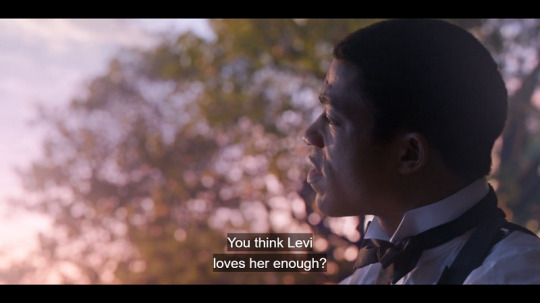
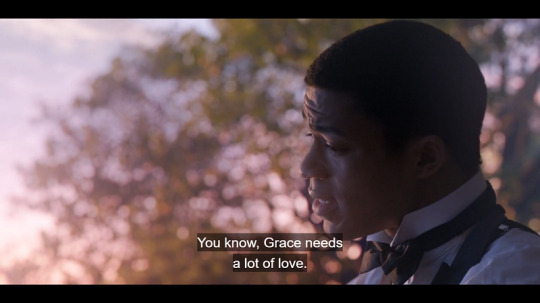
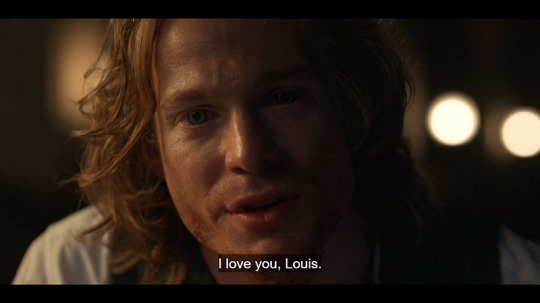
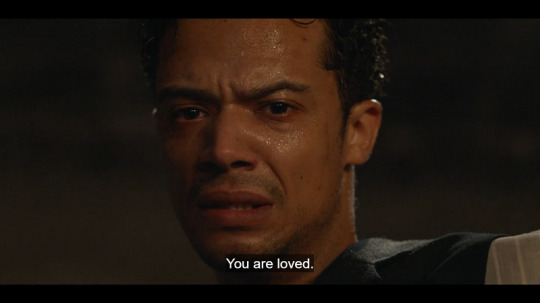
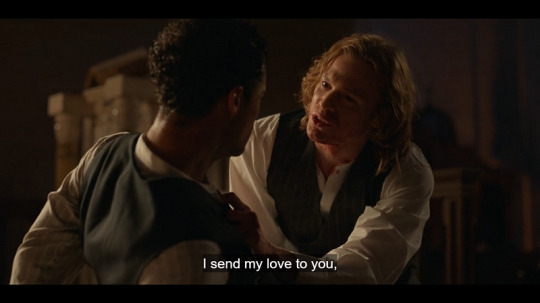
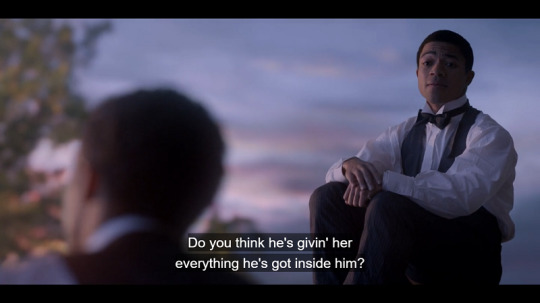
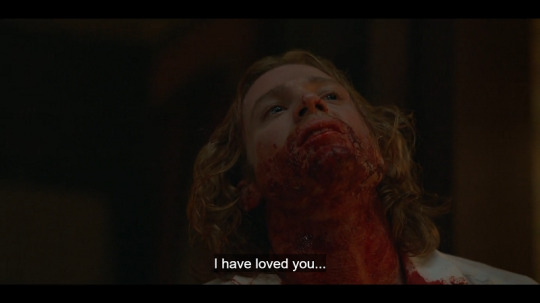
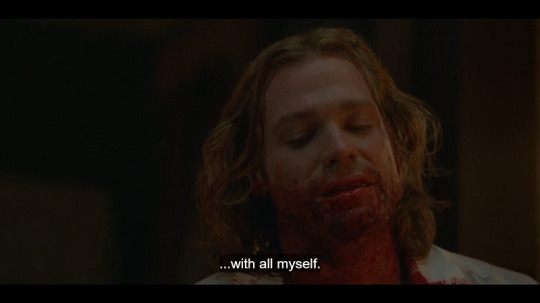
1x01 In Throes of Increasing Wonder // 1x07 The Thing Lay Still
#somebody probably noticed already but ugh this show#it begins and ends establising that lestat loves him#the episode where levi and grace get married is the episode where louis and lestat have their wedding too in that church#lestat came into his life when he craved love and acceptance that he was being continuously denied after his father died#and then was denied it some more after paul died#lestat was the only person in his life who truly saw him but did not judge him and offered him what he most needed#even if he didn't quite understand himself at the time#and was deeply in denial guilt and shame#ugh#loustat#iwtv amc#iwtv
42 notes
·
View notes
Text
The Vampire Lestat Review
Reading this after Interview With The Vampire was an absolute whirlwind. I feel as though one book should not be read without the other. If you read Interview With The Vampire, you should immediately pick up The Vampire Lestat and read it. They couple together so well that I will forever be in awe of Anne Rice.
I will first discuss the shocking alteration in Lestat's character between the two novels. Where I was left confused and underwhelmed by the cold, unfeeling portrayal of Lestat in Interview With The Vampire, I now understand it was all in Rice's careful plans. Lestat's portrayal in the first novel is undoubtedly a product of modern-day Louis' feelings and biases.
What I found most interesting about this new exploration of Lestat's character is his intense desires to be good. In both the present-day and the flashback scenes, Lestat almost completely devotes himself to trying to be good, even though he's a monster. In the opening pages of the novel (during the 'present-day' in 1984), he explicitly states that he lingered for killers to appear to feed on, and eventually states that "more than ever, I was resolute that I would not drink innocent blood" (p. 11). But these cravings for goodness transcend the act of hunting for blood. When Lestat begins to tell the audience of his life as a young mortal boy, he explores his love for the brief time he spent in a monastery, which was all just a result of the instructors there believing that he had the capacity for good, something he did not get at home with his family. This concept of goodness in Lestat all comes to a peak for me through a conversation with Gabrielle. When Gabrielle brings up ideas of dictators and chaos, Lestat immediately rebels, stating that "it is petty to destroy anything for the mere sake of destroying" (p. 336). This is a far cry from the hedonistic, and borderline cruel, picture of Lestat that we receive in Interview With The Vampire.
Lestat's explanation of Louis' portrayal of him in his novel was absolutely amazing. Building up the novel in order to explain the dissonance between the two different accounts of what really happened between Louis and Lestat was excellent and Anne Rice managed to do it in a way which was almost effortless. I was utterly seduced. What I particularly enjoyed was Lestat's explanation of how all the people he 'cruelly' hunted and murdered during their time together, were really evildoers, which was unbeknownst to Louis. Louis "told the tale as he believed it" (p. 501), and Lestat is unconditionally accepting of that fact. This was a fantastic way of Rice explaining that Interview With The Vampire still retains value and is just as valid as Lestat's account of what happened, even if what Louis relayed was not 100% true. It was true to Louis, thus, it matters still.
Moving on, I really enjoyed the random little moments of Lestat being a weird little guy. I'm not sure if Rice intentionally wrote these things to be funny, but I could not help but laugh whenever I came across them. For example, when Lestat is still newly turned and settling into the incredibly heightened senses and abilities he's gained, he picks up a rat and stares at it like the sweet baby he is: "All I could think was that the rat had very tiny feet, and that I had not yet examined a rat...I went and caught the rat...and looked at its feet. I wanted to see what kind of little toenails it has, and what was the flesh like between its little toes" (p. 120). I wanted to see what kind of little toenails it has. I wanted to see what kind of little toenails it has. How fucking endearing! Lelio, the wolfkiller, the fiercest vampire, picking up a little rat to look at its little toes. Somebody sedate me. Another example is when Rice is attempting to explain how abnormal vampires act and states that Lestat once "sat down beneath a tree, drew up [his] knees, and put [his] hands to the side of [his] head like a stricken elf in a fairytale" (p. 124). That's some cute fucking shit.
It was also really beautiful to see how unabashedly confident Lestat was in expressing his love and his queerness. When I read Interview With The Vampire and wrote my review, I was shocked by the lack of romance in the text. Retrospectively, it makes perfect sense. Louis is a patchwork of shame, suffering and self deprecation, of course he would never openly admit that what he had with Lestat was an enduring love. Or maybe he didn't even come to terms with it himself. Almost from the very beginning of The Vampire Lestat till the end Lestat is painfully open about how much he worships Louis. His vulnerability paired with Anne Rice's literary genius worked to completely ruin my life. It's been days since I finished the novel and I cannot stop thinking about the sweetness of it all. I find myself consistently picking the novel back up, flicking to the dog-eared pages I know contain Lestat's confessions of love for Louis. I read them over and over and hold each word, each letter close to my heart. Anne Rice is a master of language.
Moving onto other characters in the novel, we arrive at some of my only dislikes of the novel. I didn't dislike Gabrielle (Lestat's mother), per-se, she just made me incredibly uncomfortable. Although Anne Rice is undoubtedly talented, she had a weird knack for hyper-focusing on weird and inappropriate concepts. While many Vampire Chronicles fans have discussed how the relationship between Gabrielle and Lestat is not incestuous because they are vampires, I simply cannot abide by it. It is fucking weird. All their conversation is tainted by strange, erotic thoughts and actions and it does not matter that Gabrielle was liberated from the conventions of humans when she was turned into a vampire, she was Lestat's mother and Rice had no business having them french kiss each other every other sentence. Don't even get me started on how many times Lestat referred to his mother as his lover...ENOUGH IS ENOUGH! Why can't they have a non-incestuous relationship? I feel unsure of the value of their incestuous relationship to the novel. I definitely could have lived without it.
In regards to the other major characters, such as Marius and Armand, I thoroughly enjoyed their involvement in the novel. Many people have stated that the chapters regarding Marius' story were boring but I found them absolutely enthralling! It was so interesting to see how Rice plotted out her vampire lore. In many ways I could see how this worldbuilding inspired current vampire media and in many ways I saw aspects which were completely unique and strange, but in the best way! It was also really sweet to see how Lestat came to depend upon Marius, the only person in the world he felt he could relate to. I don't know yet how I feel about 'Those Who Must Be Kept', but I guess that's something I will discover when I move onto Queen of the Damned. As for Armand? I love that nutcase, and always have! His desperation to have Lestat love him (and more importantly, have Lestat admit that he loves him) was heartbreaking, but also paralleled how Lestat behaves toward Louis, which is even more heartbreaking. There is so much I want to say about Armand but I will keep it behind closed doors until I read The Vampire Armand!
P.S. I loved that one of the sacred rules for vampire covens was that you shant turn someone who was not beautiful. That is so bizarre but I am obsessed with the stupidity of it!
Overall, I give The Vampire Lestat a 9.5/10! I can't wait to continue this series.
#the vampire lestat#anne rice#interview with the vampire#the vampire chronicles#lestat de lioncourt#louis de pointe du lac#marius de romanus#armand#those who must be kept#book review#loustat
27 notes
·
View notes
Note
❤ : What are your muse’s thoughts on love? If they are not in a relationship, do they believe that they will ever find a perfect someone for them?
𝓡𝓪𝓷𝓭𝓸𝓶 𝓗𝓮𝓪𝓭𝓬𝓪𝓷𝓸𝓷 𝓜𝓮𝓶𝓮!
ooc:
This is such a rich question, and I hope I can answer it with even an ounce of the nuance it has in my mind. I think Louis is very easy to fall in love, and probably always was in his youth too. He was quick to fall in love, but very reluctant to ever act on it. I have a whole elaborate headcanon about Louis falling in love with a school friend of his, who has almost developed into an OC for his sheer prominence in Louis’ imagined backstory, which I have mostly developed writing in private with @deromanum. He’s prone to such fits of passion, but he very clearly over-thinks things to the point of it being almost crippling, which I think is where his reluctance to make good on his feelings often comes from. (That, and the dreaded Catholic repression, which coupled with his family expectations made it almost pointless in Louis’ mind to do anything about said feelings.) Thus, I think he accepted love would be secondary to obligation; he would be forced to marry and start a family, eventually. But I firmly believe that love has always had extraordinary power over Louis. He has definitely always read love poems, romance has had a subdued but consistent current in his life. I’m sure there are some extremely risqué letters battering around in someone’s attic signed L.d.P.L written under the duress of liquid courage and a fit of imploding desire, that very much would not have matched up with how cool Louis would have appeared when he next ran into the Beloved Friend he addressed them to.
There are, of course, many different kinds of love, and in one form or another love has informed the course of his life both mortal and immortal. Louis’ love for Paul drove him to the point of near madness and dipsomania. Louis’ instant infatuation (and then love) for Lestat completely chained him to the other vampire, and the very same thing happened when Claudia came along. Louis loves with such unutterable devotion it borders on consumption. He is so willing to do anything for those he loves, often to his own detriment, and it quite often leads him to do things he otherwise normally would not do, or might not normally allow. Louis fell in love with Armand almost instantly, because Armand appealed to the part of Louis that craved to be needed, and wanted. He’s so vulnerable to being loved, or perceiving that he is loved. He requires passion to live, being so passionate himself, and feeling so deeply.
I don’t know whether Louis necessarily believes there is someone perfect for him, because it would mean accepting entirely that he is deserving of that kind of total devotion in love, and I’m not sure if he’s there or ever will get there, on that. But I think for him, there is no life without love.
#ask meme#meta#angelotnoir#// I have been forgetting to tag and thank everyone but truly thank you all!!
4 notes
·
View notes